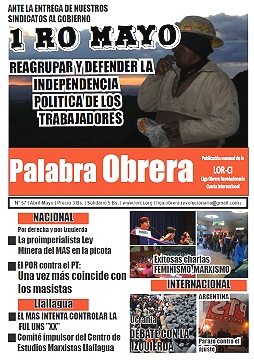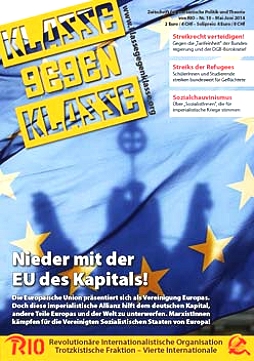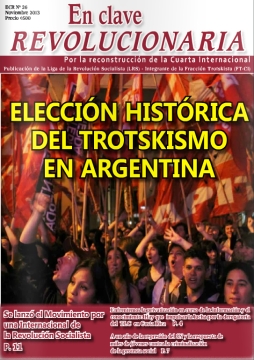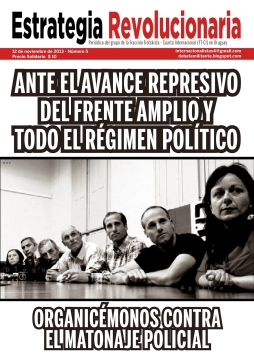Iraq
After five years of war
26/04/2008
The neo-conservative disaster of the occupation of Iraq
March 20 this year marked five years since the beginning of the war and occupation of Iraq. US President George Bush recalled this anniversary with a speech in front of military personnel, in which he stated that this was a “noble, necessary and just war” and emphasized the successes obtained in the reduction of attacks against US troops during the past year, with the sending of 30,000 additional soldiers, raising the number of US soldiers in Iraq to 160,000.
In “the world according to Bush,” Iraq would be going through “the first large-scale Arab uprising against Osama bin Laden” and would become “a place where the Arabs joined Americans to expel al Qaeda.”
Nothing could be further from reality. After five years of occupation of Iraq and the same time in Afghanistan, Bush could not declare victory in the “war on terror.” On the home front, a majority of people in the US are opposed to the war, and President Bush’s popularity has fallen to historic levels.
The strategy of neo-conservatives in the Bush administration, of strengthening US imperialism’s control over the world through “preventive war” and unilateralism, has been defeated just like the plan to “redesign the Middle East.” This has accelerated the decline of US hegemony, to which is now added the economic crisis.
The “paradoxical effect” of the overthrow of Hussein and the transfer of power from the Sunnis to the Shiites was the strengthening of Iran in the region where it has fundamental influence over the different factions of the Iraqi Shiite community that struggle for their shares of power and [Iran] has become essential for achieving any type of stability in Iraq. The symbol of this role by Iran was the visit of Iranian President Ahmadinejad to Iraq at the beginning of March and his speeches against the US occupation, speeches made while next to the Iraqi Prime Minister.
The regional context of the Middle East has been complicated by other conflicts like the attacks by Turkey, a US ally, against the Iraqi Kurds, with the Turkish army overrunning northern Iraq to prevent
the formation of a Kurdish state entity.
From the civil war to the “surge”
The Bush administration has been unable to find a solution to the situation in Iraq that would permit withdrawing the bulk of the troops, and the problem - together with the occupation of Afghanistan - will have to be solved by the next President.
But in spite of this difficult situation and the fact that the US failed to achieve its principal aims, the US has not suffered a defeat in Iraq comparable to that in the war in Vietnam. This is explained, among other factors, because the Iraqi resistance did not develop into a war of national liberation, but was used by US forces in a bloody civil war, mainly between Sunnis and Shiites, that turned the attacks against imperialist troops to attacks among Iraqis.
Although Bush was unable to present a “victory,” he at least achieved the result that during recent months the news about US casualties was not on the front pages of daily newspapers almost every day and “reduced the violence” to levels of two years ago, with an average of 26 Iraqi deaths daily.
This lessening of the attacks against the occupation troops was essentially owing to the agreement reached with the main Sunni clans and to the truce decreed by the Shiite cleric al Sadr in August 2007. Both factors seem to have entered a crisis, threatening the success of US military policy based on increasing troop levels, known as the “surge.”
The crisis of the “counterinsurgency” policy
The collaboration of the main Sunni tribal chiefs with US troops to “fight against Al Qaeda” led to the creation of irregular militias called Sahwa (“Awakening”) that have around 80,000 armed men. These
forces that the US previously called “remnants of the old regime,” and now calls “involved citizens,” are the same Sunni guerrillas, some made up of former officers of Saddam’s army that until no more than a year ago were killing US soldiers and mercenaries. These militias are the ones assigned to do the dirty work of “fighting the insurgency” in the streets of Fallujah, Baghdad, and other big cities, in exchange for a payment of $300 monthly to each member. This payment is subject to effectiveness in preventing attacks or pursuing alleged terrorists.
This made it possible essentially to maintain safety in the so-called “Green Zone” - a fortified area in the center of Baghdad that houses the Iraqi government and the US embassy - and in Anbar province, the two places where most US casualties were recorded.
This policy, that until now was functional for the counterinsurgency strategy of General Petraeus, the current military commander in Iraq, has begun to display its contradictions. In some cities, confrontations with Iraqi security forces have already begun; the Iraqi security forces follow the orders of the Shiite government of Prime Minister Nouri al-Maliki. According to the British daily The
Guardian of March 21, “the Sunni militia used by the US to fight al Qaeda is threatening a national strike because they are not paid regularly.” The March 24 attack against the “Green Zone,” that left at least 3 US civilians dead, probably begins to show a lack of cooperation by the Sunni militias.
A new rise in violence
The other sign that there could be a new outbreak of violence claiming more US lives is the breaking-off of the truce that al Sadr had decreed and that he had recently extended for six more months, after the attack launched on March 25 in Basra against his al Mahdi militia and personally led by Prime Minister Maliki. This military action in
which around 30,000 Iraqi troops, soldiers and police, participated, with air support by the US and the UK, seems to correspond to the struggle among Shiite factions to keep power in the southern provinces of Iraq, the richest in oil. This struggle has been growing since December 2007, when the British handed over control of these cities to the Iraqi government. Until now, the party that governed these provinces was the Supreme Islamic Council of Iraq, allied with the governing party, the US, and also with Iran. But it is most likely that it will lose this control to al Sadr in the next provincial elections, to take place in October.
This attack was countered by al Sadr’s militias, not only in Basra, but also in the suburbs of Baghdad, especially in the so-called Sadr City, from where it is assumed the attack against the “Green Zone” was
launched.
If this situation escalates by again reaching the previous levels of violence, any plan for orderly withdrawal of the bulk of US troops would be even more complicated.
Those in the US who now oppose the war are hoping that a Democratic administration will end the military occupation. That is not going to happen. Although there may be differences in the US ruling class over how to get out of the difficult situation in Iraq, both McCain, the Republican and Hillary Clinton and Barack Obama, the Democratic candidates, agree that a defeat of US imperialism cannot be permitted. For that reason, the Democrats, who have a majority in Congress, have voted in favor of the funds necessary to maintain the missions in Iraq and Afghanistan. Only independent mobilization and active solidarity with those who are resisting the occupation will make it possible to defeat imperialism.
The war in numbers
Military casualties since 2003
4,000 US, 175 British, 133 from other nationalities, 8,100 from Iraqi security forces, and more than 1,000 "contractors" [US mercenaries]. 60,000 US soldiers wounded.
– Iraqi civilian casualties
Between 600,000 and 1,300,000, according to estimates by different organizations (the US refuses to count civilian casualties).
– Costs of the war
They are calculated at $12 billion per month. According to economist Joseph Stiglitz, in the year 2017, 3 billion dollars will have been spent in Iraq and Afghanistan.
43% of the Iraqis live on less than $1/day; 70% are unemployed and have no access to potable water and sanitary services.
– Glossary
– The Supreme Islamic Council of Iraq (formerly Supreme Council of the Islamic Revolution) is one of the main Shiite parties, with strong ties to Iran, where its main leaders and clerics were educated. It collaborates with the US oocupation and with the Maliki government. It controls the governments of the nine provinces of southern Iraq, that are big oil-producing centers, and part of the leadership of the security forces.
– Al Mahdi Army: A militia founded by the Shiite cleric Muqtada al Sadr. It confronted occupation troops in 2004, coinciding with the uprising in the city of Fallujah. In August 2007, it confronted the militias of the Supreme Islamic Council of Iraq in a civil war that could only be halted by the intervention of the main Shiite religious authority, Ayatollah Ali Sistani. Its main basis is in the popular sectors of the Shiite community in the suburbs of Baghdad and in the cities of Basra and Najaf.
– Dawa: Historical Shiite party to which current Prime Minister Maliki belongs.
Translation by Yosef Mikha








